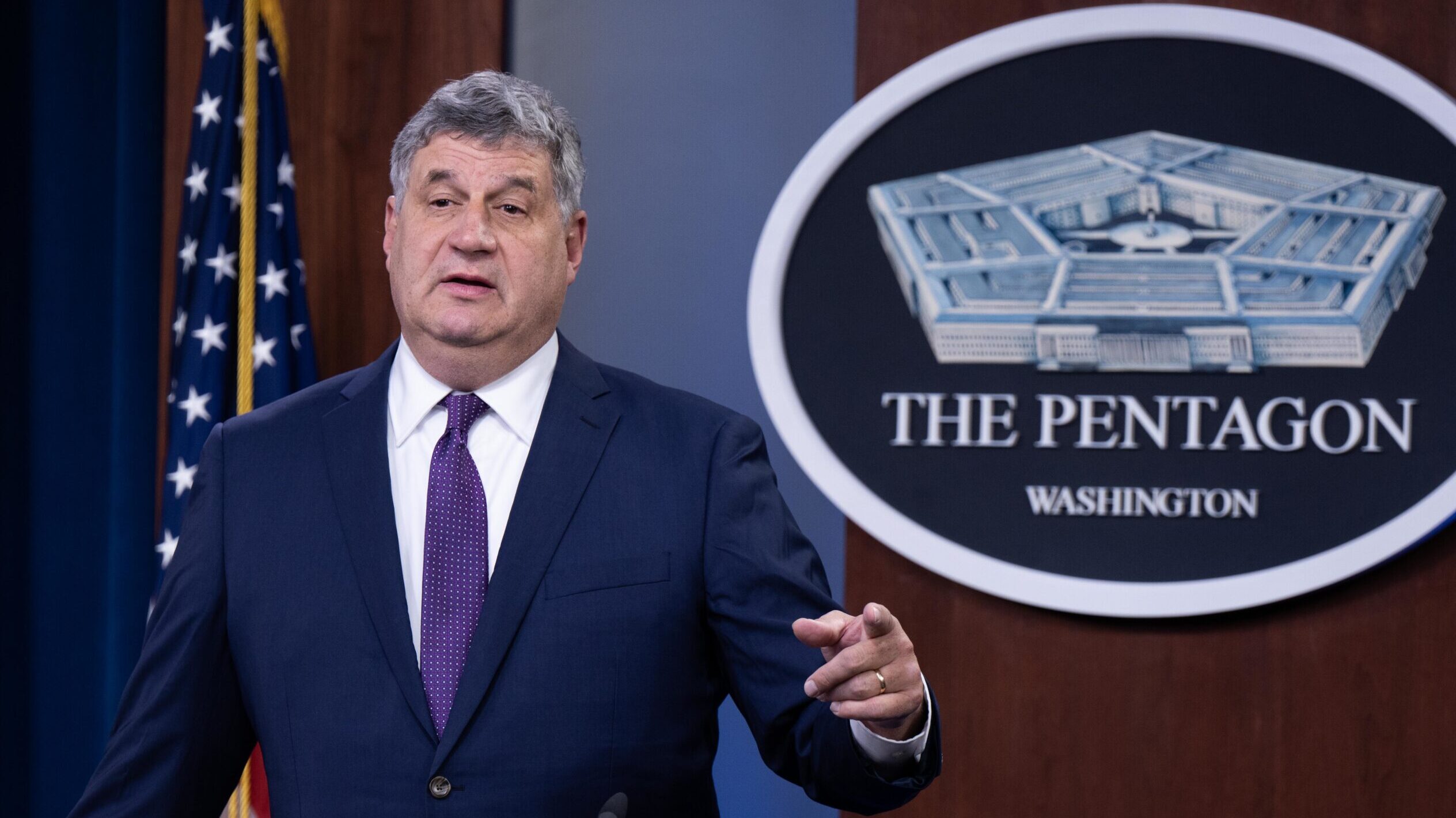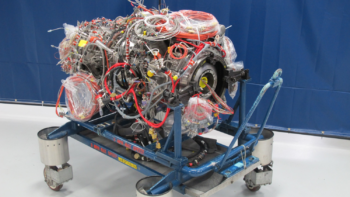
Under Secretary of Defense for Acquisition and Sustainment Dr. William A. LaPlante holds a press brief at the Pentagon, May 6, 2022. (DoD Photo by U.S. Navy Petty Officer 2nd Class James K. Lee)
WASHINGTON — The Pentagon’s top acquisition official has some harsh words for Silicon Valley “tech bros” who might seek to take credit for Ukraine’s recent military successes against Russia.
“The tech bros aren’t helping us too much in Ukraine,” Bill LaPlante, undersecretary of defense for acquisition and sustainment, said Friday at a conference hosted by George Mason University and Defense Acquisition University.
“They want to…. [but] Ukraine is not holding their own against Russia with quantum [computing]. They’re not they’re not holding their own with AI [artificial intelligence]. … It’s hardcore production of really serious weaponry,” he said. “That’s what matters.”
LaPlante added that he wasn’t suggesting that the Pentagon should curtail investments in AI or quantum computing, as those emerging technologies continue to hold promise for the department. “What I am saying is … that we’re not fighting [in] Ukraine with Silicon Valley right now, even though they’re going to try to take credit for it,” he said.
LaPlante did not elaborate on his remarks about Silicon Valley except to say he wouldn’t “name names” as to which firms have triggered his frustration. However, his comments come as the Pentagon finds itself embroiled in ongoing discussions with SpaceX over Ukraine’s ongoing use of the Starlink constellation.
SpaceX founder Elon Musk sent thousands of Starlink terminals to Ukraine in February to great fanfare — a decision made by the company without Pentagon assistance, although the United States Agency for International Development has contributed funding to supplement SpaceX’s donation, according to the Washington Post.
RELATED: A Musk monopoly? For now, Ukraine has few options outside Starlink for battlefield satcoms
In September, SpaceX sent a letter to the Pentagon claiming it could no longer pay to sustain Starlink operations in Ukraine, CNN reported last month. Although Musk has since tweeted that SpaceX had withdrawn its requests for funds, the future of Starlink in Ukraine remains uncertain, with a report published by CNN on Monday stating that thousands of terminals used by Ukraine’s military had gone offline last week.
On Nov. 1, Pentagon Press Secretary Brig. Gen. Patrick Ryder said the department “continue[s] to discuss Ukraine’s satellite communication needs with Ukraine and companies like SpaceX and others.” And while Musk made an appearance at the change of command ceremony for the Space Force’s top military officer on Nov. 2, it appears no final decisions have been made on the future of Starlink funding in Ukraine.
However, Musk isn’t the only major name in technology who has been vocal about the use of his company’s products in Ukraine. Palmer Luckey, founder of defense technology firm Anduril but probably better known as the designer of the Oculus Rift virtual reality headset, confirmed in July that Anduril has “hardware, software and people in Ukraine,” according to the Orange County Business Journal.
Roman Schweizer, a defense and aerospace analyst with Cowen and Company, said LaPlante’s comments may be less about frustration with Silicon Valley firms or emerging technologies like AI or quantum computing, and more about setting the ground for a budget battle in DC.
“Some of these tech bros — like [Jeff] Bezos or Palantir — have significant roles in the defense industrial base,” Schweizer said. (Bezos, best known as the founder of Amazon, also founded private space company Blue Origin, which has won Pentagon contacts. Palantir Technologies, which makes big data analytics products in use by the US military and intelligence agencies, was established by a group of entrepreneurs that includes Paypal founder Peter Thiel.)
RELATED: Silicon Valley warns the Pentagon: ‘Time is running out’
However, the ongoing war between Ukraine and Russia may be prompting Pentagon leaders to recognize that a sustained war against a near-peer adversary will require more legacy platforms and munitions than they had previously planned — and that increased funding for greater production is needed.
“Whether its satellite communications technology or command and control or, probably, cyber, there’s contributions throughout the range of companies, whether that’s high-tech Silicon Valley or traditional [defense contractors],” Schweizer said. “But I think the lessons learned here is that the US, NATO, allies…everyone is realizing their assumptions for platforms and munitions are way too low.”
Always Be Contracting
Throughout his speech, LaPlante emphasized that the Pentagon needs to do more to put emerging technologies into production, while at the same time ramp up production of legacy weapon systems like Stinger anti-aircraft missiles, Javelin anti-tank weapons, and the M142 High Mobility Artillery Rocket System — all of which have seen extensive use on Ukrainian battlefields and are now in greater demand by US allies and partners.
“If we’re going have surge production, we’re going to have to contract for it. It’s that simple,” he told the audience.
However, the Pentagon’s appetite to buy more weapon system comes at a time where inflation and supply chain difficulties have plagued companies worldwide, and midterm elections have raised questions about whether the United States will remain committed to Ukraine in the coming years. All this has left defense contractors unsure whether expanding production lines would be a wise long term move.
Last month, Senate Armed Services Committee chairman Jack Reed, D-R.I., and ranking member, Sen. Jim Inhofe, R-Okla., offered an amendment to the fiscal 2023 defense policy bill that would give the Pentagon the ability to broker multi-year contracts for certain munitions made by made by Lockheed Martin, Raytheon Technologies, BAE Systems and Kongsberg Defence & Aerospace over FY23 and FY24, Defense News reported.
Although lawmakers have not yet voted on that specific proposal, LaPlante said last week that he believes Congress ultimately will grant the department multi-year production authority — a power that LaPlante has repeatedly argued is the best way to signal the Pentagon’s intentions to industry.
“They’re going to give us funding to really put into the industrial base — and I’m talking billions of dollars into the industrial base — to fund these production lines. That is [what] I predict is going to happen,” he said.
“Contracts are what matters. Money is what matters,” he said. “When people see that there’s multiyear contracts coming along for munitions and that we’re going to put production lines at higher capacity, and we’re going to pay for it and we’re going to put it in the [request for proposal] and we’re going to award to it, they’ll pay attention.”
LaPlante’s focus on enabling production was not limited solely to legacy platforms and munitions being used in Ukraine. During the Obama administration, when LaPlante served as the Air Force’s top acquisition official, the US military’s ability to prototype and test cutting-edge technologies had stagnated, LaPlante said.
Recent efforts such as the establishment of the Defense Innovation Unit and the use of new contracting mechanisms such as “other transaction authorities” more readily allow the Pentagon to do business outside the traditional defense establishment. However, the department still fails to transition emerging technologies from the development stage into production.
Now, “there’s a lot more experimentation, a lot of prototyping, Section 804 [mid-tier acquisition programs], OTAs, it’s everywhere. That’s really good. But it doesn’t matter if it stays as a prototype. It doesn’t matter if it doesn’t go into production,” he said.
“If somebody gives you a really cool liquored up story about a DIU [project] or OTA [contract] ask them when it’s going into production, ask them how many numbers, ask them what the [unit cost] is going to be, ask them how it will work against China,” he said. “Ask them all those questions because that’s what matters. And don’t tell me it’s got AI and quantum in it. I don’t care.”
France, Germany ink deal on way ahead for ‘completely new’ future European tank
Defense ministers from both countries hailed progress on industrial workshare for a project that they say “will be a real technological breakthrough in ground combat systems.”


























